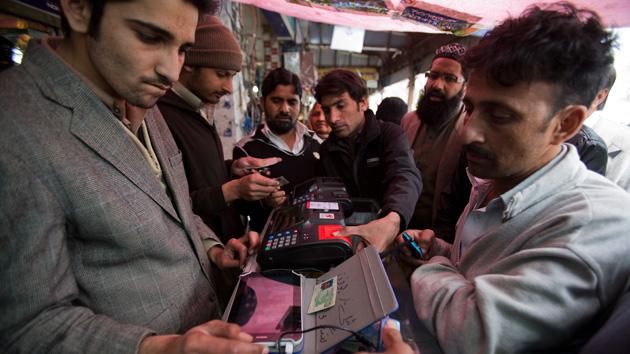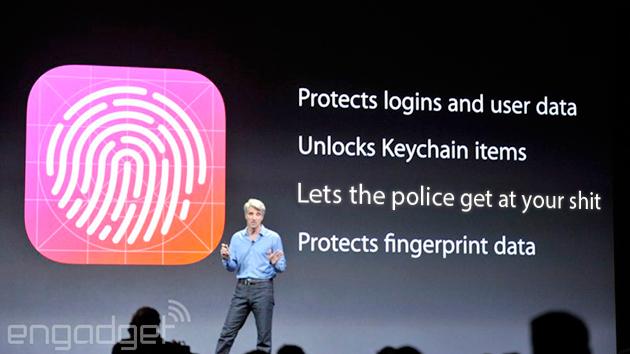fingerprint
Latest

Here's what you need for a fingerprint reader in Android Marshmallow
Google made sure that the Nexus 5X and 6P take advantage of Android Marshmallow's fingerprint reader support, but have you wondered what it'll take to get that digit scanning support in third-party hardware? You don't have to guess any longer. Google has listed the requirements for fingerprint readers in its latest platform, and they're unsurprisingly quite strict. The reader's false acceptance rate has to be virtually non-existent, and the rejection rate should be less than 10 percent. It also needs a hardware-based approach to matching fingerprints, and it must be impossible to access that data outside of the chip. Clearly, Google doesn't want a repeat of the lax security that made it easy to steal fingerprint data from some earlier Android phones.

OPM hackers took more fingerprint data than first thought
It's safe to say that the Office of Personnel Management data breach was already bad news for government workers, but things just got a bit worse. The agency now estimates that the intruders took the fingerprints of 5.6 million people, not the originally determined 1.1 million. Yes, that's five times more than first thought. Officials are quick to note that this digit data won't be as useful to the hackers as the other sensitive information leaked through the attack (fooling a fingerprint reader requires some skill). However, there's a concern that the thieves could find a way to misuse those prints -- and it's not as if you can change your fingers once they've been compromised. While there's no immediate reason to panic if you've worked for the feds, there could be additional trouble down the road. [Image credit: Bloomberg via Getty Images]

Bank of America adds fingerprint logins to its Android and iOS apps
One of the most anticipated features arriving with Android's Marshmallow OS update is the new fingerprint reader capability. And while Marshmallow won't go live until the end of the year, a number of companies are already gearing up with fingerprint-enabled apps. Bank of America is one of them. The company announced on Tuesday (via its app update screens) that it has added fingerprint recognition for both Android and iOS' Touch ID to its mobile banking app. [Image Credit: Associated Press]

Android fingerprint readers may be easier to hack than Touch ID
There's nothing like a Black Hat Security Conference to leave you feeling exposed and vulnerable. Today's compromise? Fingerprint readers. Security researchers Tao Wei and Yulong Zhang have exposed some pretty significant flaws in the Android fingerprint framework. The duo outlined a couple of different attacks -- including malware that can bypass fingerprint-authenticated payment systems and various backdoor attacks -- but the biggest offender was a "fingerprint sensor spying attack" that could remotely lift prints from affected phones. Researchers found the attack viable on both the HTC One Max and the Samsung Galaxy S5, but not on iPhone or other Touch ID devices.

Your next phone could have a fingerprint reader on its screen
Security technology firm Sonavation recently unveiled a novel means of embedding an ultrasonic fingerprint reader directly into a Gorilla Glass display. With it, mobile devices would no longer need a physical button, like the iPhone's Home button, to use as a fingerprint reader. Instead, they'd be able to press anywhere on the screen, finger grease smudges allowing. Apple has reportedly been working on a similar idea, although it doesn't seem likely we'd see a buttonless iPhone for at least another year.

Samsung's Galaxy A8 is its thinnest phone yet
Samsung has quietly launched its slimmest smartphone ever in China. The Galaxy A8 isn't a spec-monster, but it's certainly a design feat for a company that gets criticized a lot on that front. The all-metal body is just 5.9mm thin, weighs a mere 151 grams (5.3 oz) and has a bezel size that you can basically round down to zero. The internals are still good enough to fight any mid-range device: a 5.7-inch 1080p OLED display, 8-core Snapdragon 615 chip, a 16-megapixel f/2.2 rear/5-megapixel wide-angle f/1.9 front camera and 2GB of RAM. Despite the size, Samsung managed to squeeze in a generous 3,050mAh battery that's larger than the Galaxy S6's.

Standalone scanner keeps your prints out of hackers hands
The ease with which hackers seem able to access password secured computer systems including airlines, major corporations -- even the White House -- it's little wonder that the security community is scrambling for alternatives. But even biometric locks that scan our irises, faces, and fingerprints can be broken if they're connected to a compromised computer. That's why Synaptics has developed a fully self-contained fingerprint scanner.

MasterCard is testing a new way for you to pay with your face
MasterCard announced on Thursday that it's looking to add a layer of biometric security to its credit cards and all user will need to do is simply take a selfie. The system will create a digitized map of your face, convert that map into a hash and compare it to the hash stored on Mastercard's servers. Users will be able to pay through a mobile app with either their fingerprints or by staring into the device and blinking once. The blink is used to prevent someone from just holding up a picture of you to spoof the system. What's more, "They're storing an algorithm, not a picture of you," Phillip Dunkelberger, who runs Nok Nok Labs, told CNN Money. "And I'm sure they're doing the appropriate stuff to guard it."

Watch Synaptics' touch-sensitive space bar in action
Earlier today, Synaptics announced its SmartBar technology that adds a touch input area -- enabled by a sub-0.2mm-thick PET film -- onto the space bar, which then lets you perform certain tasks without having to touch the mouse or trackpad. We went over to the company's show room at Computex to check this out, and we came away impressed. In the first demo, we looked at how you can quickly select text while typing by simply swiping to the left on the space bar. We were then shown how you can scroll with two fingers on the space bar: hold down one on the left and swipe with another on the right for vertical scrolling, and vice versa for horizontal scrolling. This will take some getting used to, obviously. You can also zoom in and out by swiping both fingers inwards or outwards -- a bit like pinch-to-zoom but on a space bar.

Google standardizing fingerprint IDs across Android devices
At its I/O conference, Google's just revealed that it will standardize fingerprint ID security across Android M devices, so that manufacturers like Samsung don't need to build their own. That means developers will be able to use an open system that lets you unlock your device, buy with Google Pay, pay at Google's Play store and perform other common functions with your digits. The system will also be bundled in its API to help developers integrate it into third-party apps. In other words, it'll work much like Apple's fingerprint system already does. Don't miss out on all the latest news and updates from Google I/O 2015. Follow along at our events page.

Pakistan orders cellphone users to provide their fingerprints
Pakistan is determined to prevent terrorists from using untraceable cellphone accounts to coordinate attacks like that in Peshawar, even if it means eroding civil liberties in the process. The country has ordered cellphone users to have their SIM cards verified through fingerprints, theoretically discouraging extremists from relying on local carriers to communicate or trigger bombs. People have until April 13th (carriers have to comply by April 15th) to get their digits on the record if they want to keep their cell service intact.

Windows 10 log-in options will include fingerprint, facial and iris recognition
Microsoft thinks it's high time you ditch your passwords. The company, which is readying Windows 10 for release later this year, just announced that its next-gen OS will include built-in support for several alternative log-in options, including fingerprint, facial and iris recognition. That means so long as a Win 10 machine has at least one of the necessary sensors -- a fingerprint reader, eye scanner or illuminated IR sensor for facial recognition -- there will be a built-in framework called "Hello" that helps users enroll their fingerprints, or face, or what have you. In other words, then, regardless of who made your machine (Acer, HP, et cetera), you'll get a consistent user experience for setting up a biometric log-in.

Qualcomm's next chips will help smartphones think for themselves
Qualcomm teased the prospect of smartphones that learn a couple of years ago, and it's now much closer to making them a practical reality. The chip designer has revealed its next big mobile processor, the Snapdragon 820, will be one of the first that can handle its Zeroth cognitive computing platform. In short, it'll let your phone learn about you (and the world around you) to take action on its own. You should see photo apps that detect whole scenes, security tools that protect against unknown viruses and interfaces that depend more on expressions and head movement than button taps. It gets more ambitious than that, though. Zeroth allows for always-on sensors that detect your surroundings (such as through motion or sound) and help your phone anticipate what you want.

You only need a camera (and luck) to copy someone's fingerprints
Forget having to lift smudges from a touchscreen to copy someone's fingerprints. According to a Chaos Computer Club presentation, you only need a camera... well, that and a little luck. The hacking association's Jan Krissler recently demonstrated that you can reproduce someone's fingerprint by getting a few good photos of their hand and processing it through off-the-shelf authentication software like VeriFinger. In Kessler's case, he got the German Defense Minister's thumbprint through photos from a press conference.

Coming soon: laptops with fingerprint sensors built into the touchpad
At some point -- probably when the iPhone 5s came out -- fingerprint sensors became cool. Yes, they've been used on business laptops for years, but it's only recently that we've started to see them in stuff consumers would buy -- things like smartphones and tablets. Now, it seems, we're coming full circle. Synaptics, the leading maker of laptop trackpads, just announced something called the SecurePad, a touchpad with a fingerprint sensor built into the upper-left corner. Unlike existing fingerprint scanners for laptops, which require users to swipe their fingers over the sensor, this one uses capacitive touch, similar to the fingerprint modules used in devices like the iPad mini 3 and Galaxy S5. The result should hopefully be a more reliable experience than you would have gotten on older-gen laptops, but as we've seen with newer products, even touch-based fingerprint scanners can be a mixed bag.

Virginia court says fingerprint-locked smartphones are fair game
Here's some trivia for your next trip to the pub. Did you know that, in Virginia, you don't have to tell the cops your phone's unlock code, but you're obliged to open it if you use a fingerprint based passcode? It's a quirky piece of legal precedent that's just been established in the state after a key piece of legal evidence was believed to be trapped on the defendant's smartphone. According to The Virginian-Pilot, the court ruled that the fifth amendment's provisions against self-incrimination protect against giving up your passcode, but that since a fingerprint is already taken by the police - same as DNA or handwriting samples - it's fair game. Naturally, this is just one circuit court judgment in one state, but we imagine this is the sort of thing winding up at the supreme court in a few years time.

New MasterCard combines a fingerprint sensor with NFC
For awhile now, there's been a number of companies trying to simplify payments for everyone. Google did so with Wallet and, most recently, Apple announced it would be doing something similar with the soon-to-be-launched Apple Pay, among others. Not surprisingly, MasterCard's, synonymous with paying for stuff, is working on a product of its own. In partnership with Zwipe, a company that focuses on biometric tech, MasterCard has built a charge plate with a built-in fingerprint sensor and NFC, albeit for trial purposes. The Zwipe MasterCard, as it is currently known, is said to be extremely secure -- all data is stored directly on the card, rather than an outside database, for example.

Test code hints at future iPads with Touch ID and Apple Pay
There have been photos and vague rumors hinting that Apple's next iPads will involve more than just a speed bump, but there hasn't been much in the way of hard evidence... until today, that is. Hamza Sood has uncovered code in the iOS 8.1 developer beta that alludes to unannounced iPads with Touch ID fingerprint readers and, appropriately, Apple Pay support. Don't think that you'll be tapping your iPad to pay for goods at the local shop, however. From all indications, this is just for in-app transactions; there's no mention of NFC. It's also unclear when this new iOS version will arrive, although history suggests that the new iPads (and thus the finished 8.1 update) could surface in October.

Barclays wants you to give it the finger instead of a PIN
PINs, passwords and authentication codes: they're a troublesome security solution that we'd love to see the back of. The bankers at Barclays know this, so they've looked to biometrics in a bid to banish them forever. Today, the company announced that it's teaming up with Hitachi to launch a new reader capable of scanning and recognising the unique vein patterns a customer's hand. It'll let you scan your finger to quickly access your online bank accounts and authorise payments, reducing fraud in the process. Hitachi's Finger Vein Authentication Technology does the hard work and is said to be significantly harder to spoof because it'll only work if the scanned finger is "attached to a live human body" (no finger-lopping movie plotlines happening here). Barclays' Biometric Reader will roll out first to business account holders from next year, but staff at UK branches may ask you to put your best finger forward in the very near future.

Leak hints the Galaxy S5 Mini will keep its bigger sibling's sensors
While many have been expecting Samsung to launch a mini version of the Galaxy S5 given the company's past habits, there have been questions about just what the smartphone would include. Would it be as hobbled as last year's S4 Mini? Maybe not. SamMobile has received photos of a purported Galaxy S5 Mini which hint that this smaller device could include the fingerprint and heart rate sensors of its full-size sibling, as well as the water-resistant shell. Not surprisingly, it would also share the Ultra Power Saving mode and other software tricks.








